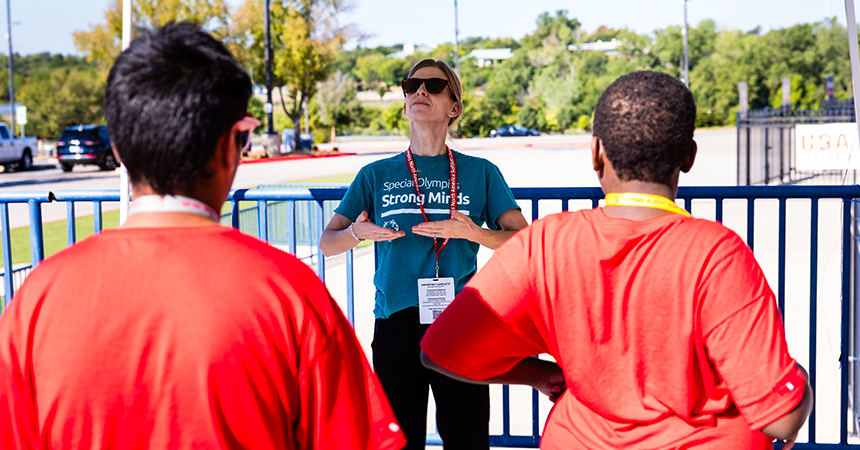Imagine being an athlete ready to compete at the highest level, but you’re distracted by a throbbing mouth from tooth pain. Or trying to run down the track in shoes that aren’t the right size for you. Or maybe standing at home plate ready to hit the softball, but not being able to see it because you need new glasses. Suddenly, all the hours of practice you’ve put in don’t matter because your health is keeping you from competing at your best.
Unfortunately, for many Special Olympics athletes, this isn’t just an imagined scenario—it’s a regular occurrence.
Sitting near the entrance to Devon Park is a table highlighting Special Olympics Healthy Athletes® and encouraging the athletes competing at the 2025 Special Olympics North America Softball Championship to get screened. Just behind the concourse of the first-base line are a handful of tents with medical professionals and college students. Athletes from across the United States and Canada participated in several health disciplines, including Strong Minds and Special Smiles.
Once the athletes made their rounds, they could choose from a series of prizes. On the second day of the tournament, a banner hung at the stadium entrance that read, “I am a healthy athlete.” People were encouraged to sign it.
The choice to make Healthy Athletes a prominent part of the event sent a powerful message to all who attended: health, both mental and physical, is a critical component to competing on the field of play.
Healthy Athletes was introduced in 1997 when the organization started offering free health screenings and education to Special Olympics athletes. Since then, over two million free health screenings have been provided, and more health professionals are learning how to treat those who have intellectual disabilities.
The Special Olympics North America Championships, hosted in golf, tennis, pickleball and softball, are regional competitions that bring together athletes from Canada, the Caribbean and the United States. In addition to providing advanced competition opportunities, SONA Championships also offer a valuable chance to reinforce key health messages with athletes.
Amanda Webb is the clinical director of Strong Minds for Special Olympics Oklahoma, and in her role, she teaches athletes emotional wellness techniques, including at the 2025 SONA Softball Championship. “They have tools to stay calm, manage their nerves about competing and to help their everyday life,” Webb said about the work she does. “We have six different stations we put them [athletes] through where we teach how to manage stress, the importance of partnership, the importance of using strong messages and we’ll do some breathing techniques, stretching and relaxing techniques.”
Mental wellness is such an essential part of sport, and having the ability to teach these techniques on-site at a softball tournament was crucial. Softball is a very high-paced, energy-filled sport, and it’s important to send the message that being in shape and doing the things you’re supposed to do to compete at that high level is a part of being an athlete.
Talon Rodriguez, the health and wellness coordinator for Special Olympics Oklahoma, says the Program focuses heavily on fitness and wellness programming, creating a variety of fitness challenges.

“For a lot of traditional athletes that you see in high school sports, college sports, pro sports, fitness, wellness, and nutrition have been ingrained in them from a young age, and it’s kind of just second nature, but that’s not necessarily the case for everyone,” Rodriguez said. “Athlete or Unified partner, a lot of people don’t grow up with the support system that is really driving home the importance of overall wellness and health.”
Special Olympics often fills that gap, providing athletes with valuable health education materials and preventive screenings. But in the future, the hope is that there won’t be a gap to fill, and health systems will adequately support people with intellectual disabilities.
“Health should just be health; we shouldn’t have to have inclusive health,” Rodriguez emphasized.
